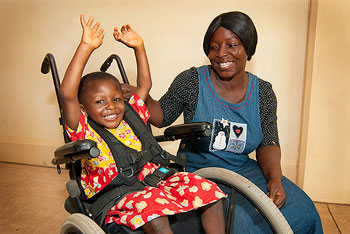When you encounter a person living with a disability, what’s your first reaction?
Do you look away and try to avoid them, uncomfortable that they don’t look or act “normal”?
Do you immediately feel pity or sadness for their disability?
Or, do you see them as someone God can use to share His love and grace with others?
For some people, the idea that people living with disabilities can serve God, and not just be served by others, is difficult to grasp. Too often we look at people using only our human eyes and completely miss the way God sees them – as His loved and cherished creation.
This month, we’re focusing on what The Cape Town Commitment has to say about Disability Ministry. Joni Eareckson Tada, Lausanne Movement Senior Associate for Evangelism Among Disabled People, says, “Our human experience has been deeply affected by the fall of man—and nowhere is it more evident than with suffering and disability.”
In her article, Joni confronts the prevailing Post-Modern mindset that people are better off “dead than disabled” and challenges Christians to instead adopt a, “biblical worldview [that] assures us that God is in the process of redeeming suffering and disability.” Joni goes on to say, “people with disabilities have a unique opportunity to glorify God by fitting into God’s redemptive plan to make that which is broken, whole.”
Read Joni’s Article On Sanctity of Life and Disability.
Biola University Professor Kathy McReynolds further explores the idea Joni raises about the impact of the “Age of Enlightenment” on today’s view of disability. She questions whether indeed we have too much freedom, freedom that has drawn us away from Judeo-Christian values and instead finds us “picking who may live and who must die.”

Rick Langer, also a professor at Biola University, says the question of why God allows disability is a paradox. He adds that, “Most people expect the world to be a fallen place; they just do not expect their world to be a fallen place. When something bad happens to others we sigh and say ‘It’s a fallen world.’ When something bad happens to us we cry and say, ‘I never thought it would happen to me.’”
The Cape Town Commitment (CTC), Part 2, Section IIB, 4, notes that people with disabilities make up one of the largest ministry groups in the world – with some estimates putting the number at 600 million people. The CTC emphasizes that while,
“. . . physical or mental impairment is a part of their daily experience, most are also disabled by social attitudes, injustice and lack of access to resources.”
The CTC exhorts Christians to serve people with disabilities, not just by providing medical or social care, but also by,
“. . . fighting alongside them, those who care for them and their families, for inclusion and equality, both in society and in the Church.”
Additionally, the CTC urges Christians,
“. . . both to minister to people with disabilities, and to receive the ministry they have to give,” by “. . . recognize[ing], affirm[ing] and facilitate[ing] the missional calling of believers with disabilities themselves as part of the Body of Christ.”
Read The Cape Town Commitment – Part 2, Section IIB, 4.
You are invited to Join the Conversation on Christ’s Peace for People with Disabilities, sharing your experiences and learning from others.
Additional articles, resources and videos will be shared in the next few weeks as a part of our focus on Disability Ministry. See below for the full list of resources as they are added throughout the month.
This Month: New Resources in the Conversation on Disability Ministry
Week 1: The Sanctity of Life
Lead Article
Sanctity of Life and Disability – Joni Eareckson Tada
Responses
- A University Professor’s Response to Sanctity of Life and Disability – Kathy McReynolds
- Rick Langer Responds to Sanctity of Life and Disability – Rick Langer
Additional Resources
- Audio: JAF radio broadcast “Sanctity of Life Sunday”
- Video: Joni speaking at Biola University introducing the Theology of Disability and Suffering course
Week 2: Disability Ministry – A Challenge to the Church
- How Does God View People with Disability? – Joni Eareckson Tada and Jack S. Oppenhuizen
- A Biblical Perspective on Healing – Joni Eareckson Tada and Jack S. Oppenhuizen
- Video: The Tale of Two Families (Part 1 | Part 2) – Joni and Friends
- God’s Healing Presence in My Life – Joni Eareckson Tada
Week 3: A Biblical Basis for Disability Ministry
- The Kingdom of God and Disability – Steve Bundy
- A Middle Eastern Response to the Kingdom of God and Disability
Week 4: Including People Affected by Disability in Ministry
- God’s Story of Disability: The unfolding plan from Genesis to Revelation – Dr Dave Deuel
- Holly’s Heart – Holly Strother
- Interview with Hillary Marides – Joni Eareckson Tada
Week 5: The Sanctity of Life Challenged
- The life of Terri Schiavo Part 1 & Part 2 – Joni and Friends
- “Euthanasia” – Joni Eareckson Tada
- “Seth is a Perfect Child” – Interview
- Useless Eaters – Multimedia Presentation
- The Sanctity of Life Challenged – Joni Eareckson Tada
Join the Conversation on Disability Ministry
Next month, we’ll take a look at The Cape Town Commitment and Partnership and Collaboration with Dr. Phill Butler, Lausanne Senior Associate for Partnership, and the team at visionSynergy.
